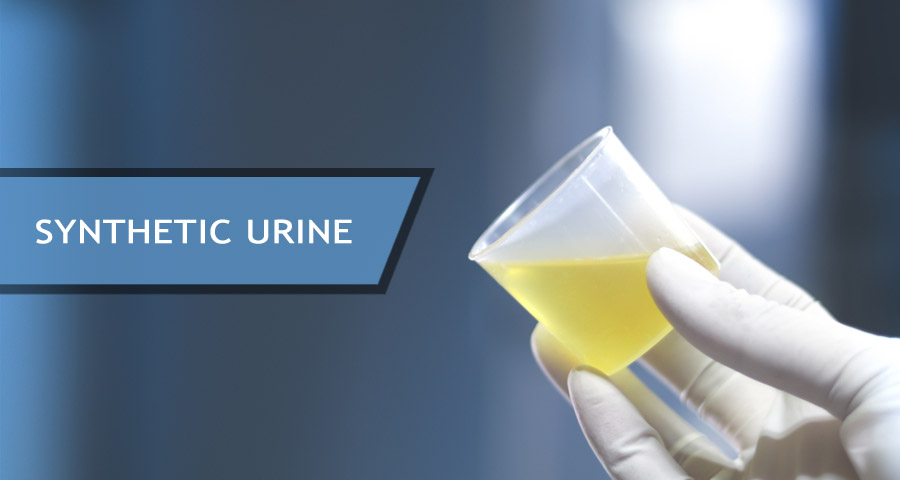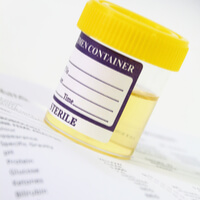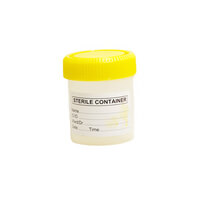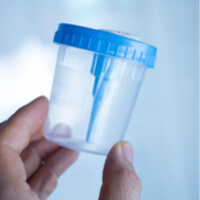Synthetic Urine: What is it and Why It Should Not Be Used

Table of Contents
How Does Synthetic Urine Work?
Synthetic urine is a substance that imitates real urine. Often sold as a powder, synthetic urine is mixed with water to provide a pee-like substance. Kits are sold online and may include heating pads to keep the temperature between 32° and 38° C.
The Top Urine Drug Tests
5 Panel T-Cup CLIA Urine Drug Test Cup
Workplace/Schools/Forensic
 The 5 Panel T-Cup Urine Drug Testing is an all-embracing integrated urine drug testing cup that can discover the five most commonly used illegal drugs in urine. It features three distinct configurations that ensure a completely accurate test option for several organizations. Additionally, the 5 Panel T-Cup Urine Drug Testing has a cap with a silicone gasket that prevents leakage by forming a tight seal.
The 5 Panel T-Cup Urine Drug Testing is an all-embracing integrated urine drug testing cup that can discover the five most commonly used illegal drugs in urine. It features three distinct configurations that ensure a completely accurate test option for several organizations. Additionally, the 5 Panel T-Cup Urine Drug Testing has a cap with a silicone gasket that prevents leakage by forming a tight seal.
13 Panel iCup FDA Cleared Urine Drug Test Cup
Workplace/Schools/Forensic
 The 13 Panel iCup FDA Cleared Urine Drug Test Cup is a comprehensive cup for testing drugs in urine. It gives an individual or employee the chance to detect at least 13 major abused illegal drugs in urine. This product comes with an in-built temperature strip that verifies the specimen is valid thereby, preventing adulteration or substitution of the sample. The 13 Panel iCup FDA Cleared Urine Drug Test Cup also features a security seal, two-part result form, and flat panel that makes it easy to photocopy results.
The 13 Panel iCup FDA Cleared Urine Drug Test Cup is a comprehensive cup for testing drugs in urine. It gives an individual or employee the chance to detect at least 13 major abused illegal drugs in urine. This product comes with an in-built temperature strip that verifies the specimen is valid thereby, preventing adulteration or substitution of the sample. The 13 Panel iCup FDA Cleared Urine Drug Test Cup also features a security seal, two-part result form, and flat panel that makes it easy to photocopy results.
10 Panel DrugConfirm CLIA Urine Drug Test Cup
Workplace/Schools/Forensic
 This drug testing cup is perfect for urine drug testing as it can be used in homes, workplace, rehab centers, schools, and much more. The 10 Panel DrugConfirm CLIA Urine Drug Test Cup comes in three different configuration options, each meeting at least ten testing needs. It features a security seal label and temperature indicator strip that ensures 99 percent accuracy without alteration.
This drug testing cup is perfect for urine drug testing as it can be used in homes, workplace, rehab centers, schools, and much more. The 10 Panel DrugConfirm CLIA Urine Drug Test Cup comes in three different configuration options, each meeting at least ten testing needs. It features a security seal label and temperature indicator strip that ensures 99 percent accuracy without alteration.
Does Synthetic Urine Always Work?
Drug Testing
Drug testing in the United States is a standard procedure performed by many companies in order to prevent injuries and increase safety. While some organizations don’t conduct testing, many use different forms of testing to check if their employees follow organizational rules and policies.
Around 61.8% of companies, according to data provided by the American Management Association, test their employees, and not only for safety. Drug use can lead to low productivity and drug abuse, which costs companies money. Urine testing is one of the most efficient ways to check a person.
Urine Testing
Urine testing is one of the cheapest and easiest ways to check if a person is abusing any substances. 52.5% of all drug tests are used in the preliminary process of recruitment. Users report the following ways of passing a urine drug test if some drug or illegal substance was taken recently: sample dilution, adulteration, or substitution.
- A diluted sample contains a higher amount of water, lowering the drug ratios. This does not mean that urine is mixed with water. If one drinks a lot of water before giving the sample, dilution can be achieved. However, dilution doesn’t guarantee a negative result. Some people pour water directly into the sample, and that’s why many labs add dyes to their toilets and don’t allow the usage of a sink.
- Adulterating a sample means adding chemicals, such as soap, vinegar, etc., to the urine, to interfere with the drug levels of the testing equipment. However, sometimes adulteration can cause a chemical reaction, and the “bubbling urine” may be turned.
- Substituting. Some people use another person’s urine, though this method can be tricky. Never know who is on what, and in at least one instance a man used his girlfriend’s urine and tested…pregnant. Others have used a pet’s urine, with poor results. Also note that real urine grows bacteria after 8 hours.
Passing The Test
Compared to hair tests, which go back 90 days, and saliva tests, which go back 3 days, urine tests are the preferred method to test for drugs. Statistics show that more than 2,200,000 drug tests every year come back positive, and many of them are people who tried to pass unsuccessfully.
One of the biggest challenges of fake urine is figuring out how to smuggle it in. There are many safeguards in the lab facilities, coats and bags are not allowed, soaps are removed, and taps are off.
Laboratories nowadays are very advanced, and many products can’t catch up to the testing technologies. Labs perform an EMIT (enzyme multiplied immunoassay technique). They measure the temperature and color. Additionally, there are GC-MS machines (gas chromatography-mass spectrometry).
Drugs & Testing
Every drug is different. It’s not clear how long a particular drug can stay in the system to be detected. It’s also very individual and depends on a person’s history of abuse. One can get clean from cocaine fast, while cannabis can stay between 7 and 30 days in the urine. There are even cases of people that tested positive for marijuana months after detox.
With a good diet, a lot of rest, exercise, and plenty of water, one can get clean in around 4-6 weeks. It is possible to use synthetic urine to cheat and pass, but of course, drug-free life is the most useful way to beat a drug test.
- Victor J Kim, Catherine K Okano, Caroline R Osborne, Deanna M Frank, Christopher T Meana, Marisol S Castaneto, Can synthetic urine replace authentic urine to "beat" workplace drug testing?, https://pubmed.ncbi.nlm.nih.gov/30194711/
- T. G. Dhanalekshmy, C. Aravindakshan, S. Sindhu, S. V. Roshni, R. K. Vathsala, Y. M. Fazil Marickar, Natural Urine Versus Synthetic Urine for Studying Inhibitors, https://link.springer.com/chapter/10.1007/978-1-4615-2556-1_83
